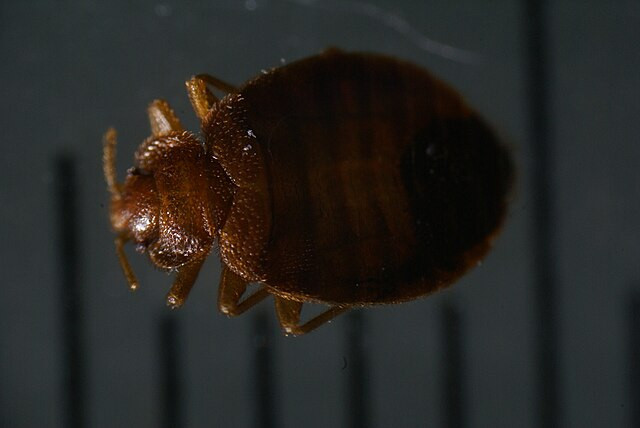Last month, Mathilde Panot, a left-wing French lawmaker and leader of the "France Unbowed" parliamentary group, raised concerns in the French National Assembly about a growing bed bug crisis in France. Holding a glass jar containing bed bugs, Panot warned of a nationwide panic and questioned Prime Minister élisabeth Borne on the government's plans to address the issue, suggesting action might only be taken if the Prime Minister's office itself were infested.
Within a week of Panot's inquiry, the French government convened an emergency meeting to discuss the crisis. This swift response led to some media outlets humorously hoping for similar decisiveness on major issues like taxes and debt.
Since late August, French citizens have been sharing photos on social media of bed bugs in various public places, including trains, subways, and even movie theater seats. As panic spreads, there is growing concern that this bed bug crisis could negatively impact the tourism industry and the image of the 2024 Paris Olympics.
While France grapples with this issue, other countries like the United Kingdom and South Korea have also reported a rise in bed bug complaints, with South Korea experiencing an unusual increase after nearly a decade of few reports. Experts believe the resurgence is due to increased human mobility post-COVID-19, bed bugs' growing resistance to insecticides, and rising temperatures.
Concerns for the Paris Olympics Reports of increasing bed bug infestations in Paris, the host city for the 2024 Olympics, have been emerging since September. Public transportation, cinemas, and even airports in Paris have not been spared.
A customer shared photos on platform X of being bitten by bed bugs while watching a movie in a Parisian cinema, prompting the cinema to apologize and inspect all its halls.
Bed bugs, which typically hide during the day and are active at night, feed on human and animal blood. They are found in indoor environments like wall cracks, wooden furniture, mattresses, and public transport seating. Bites can cause skin inflammation, itching, and pain, affecting sleep quality. While bed bugs are less likely to transmit diseases compared to other insects, their bites can lead to severe allergic reactions and psychological distress, including nightmares, insomnia, anxiety, and depression.
By last month, the French Education Minister confirmed the presence of bed bugs in 17 educational institutions, with seven temporarily closed. The French Pest Control Association reported a 65% increase in bed bug-related inspections this summer. Some Paris Metro passengers, fearing bites, prefer to stand rather than sit.
French Transport Minister Jean-Baptiste Djebbari announced the deployment of sniffer dogs on Paris Metro and national trains to detect bed bugs. He also urged the public not to panic, stating that there is no bed bug outbreak on public transport.
The bed bug issue is not new in France. A survey by the French Agency for Food, Environmental and Occupational Health & Safety found that over 10% of French households have faced bed bug problems since 2017.
The survey also revealed that a single bed bug extermination costs an average of 866 euros, a significant expense for ordinary families. Extermination in France is typically handled by professional companies.
With the high cost of extermination and the upcoming 2024 Olympics, the bed bug issue has become a political tug-of-war between Paris authorities and the French government.
Paris Deputy Mayor Emmanuel Grégoire labeled the spread a "public health" issue, urging the government to resolve it before the Olympics next July. He also highlighted the financial burden on low-income families amidst rising prices.
A French government advisor, in an interview with the media, suggested that Parisians' concerns about bed bugs are exaggerated, noting that the problem has existed for decades and is not unique to France.
Before this bed bug crisis, the Paris Olympics had already faced negative publicity. In mid-last month, French prosecutors raided the Paris office of the 2024 Olympic Organizing Committee, investigating allegations of financial misuse, conflicts of interest, and favoritism in tendering processes.
In June, French prosecutors had already conducted a raid on the committee's office, and some staff members' homes were searched. Over 20 contracts related to the Olympics are under investigation, with no formal charges yet.
Why the Increase in Bed Bugs The UK and South Korea have also seen a rise in bed bug incidents. Earlier this month, a library in West London closed temporarily after discovering bed bugs.
Since the beginning of the month, London pest control companies have received numerous bed bug-related inquiries. One company told Sky News that bed bugs were found in offices, residences, and even cars in West London, mirroring the situation in Paris where bed bugs were also spotted on the subway.
In Asia, South Korea reported 30 bed bug complaints last week, over half from Seoul. From 2014 to 2022, South Korea had only nine such complaints.
The South Korean government has declared November 13 to December 8 as a focused bed bug control period. The Ministry of Health and Welfare, in conjunction with local governments, will inspect and exterminate bed bugs in high-risk areas such as accommodations, social welfare facilities, school dormitories, educational reform facilities, and public transport.
According to Yonhap News Agency, recent sales of bed bug insecticides in South Korea have surged by 813%, with bedding cleaning products up 610% and bed and cushion covers up 111%. Officials suspect the current outbreak may have been brought in by European travelers.
French and British researchers believe the recent increase in bed bug incidents is linked to increased human movement. The spread in France coincided with Paris Fashion Week, and Paris is one of the world's most visited cities, hosting 44 million tourists last year.
Additionally, French entomologist Jean-Michel Berenger pointed out that insecticides, including DDT, effectively controlled bed bugs for decades. However, after discovering DDT's harmful effects on humans, many countries banned its use in the 1970s.
Now, milder insecticides have replaced DDT, but bed bugs have developed resistance. The French government recommends non-chemical extermination methods, using high temperatures or freezing to physically eliminate bed bugs.
Berenger also noted that temperature affects bed bug reproduction, with higher temperatures shortening the incubation period. In September and October this year, Paris experienced temperatures 4.5°C higher than usual. When indoor temperatures are between 25°C and 26°C, bed bug eggs hatch in just five days, compared to ten days at 20°C.
The British Pest Control Association advises regular room cleaning, washing bedding, checking bed linens, mattress edges, and headboard crevices in hotels, avoiding placing luggage on beds or furniture, and inspecting luggage before returning home to prevent bed bug infestations.






